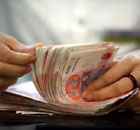Markets
Bubble fears see stocks drop to 7-month low
By Zhang Shidong (China Daily)
Updated: 2010-05-05 09:58
 |
Large Medium Small |
SHANGHAI - Chinese stocks fell on Tuesday, sending the benchmark index to the lowest in seven months, on concern ordering banks to set aside more reserves won't be enough to avert asset bubbles in the world's third-largest economy.
Industrial & Commercial Bank of China Ltd and Bank of China Ltd retreated at least 1.1 percent after Deutsche Bank AG said the reserve ratio increase removes 300 billion yuan ($44 billion) from the financial system. Developers China Vanke Co and Poly Real Estate Group Co tumbled more than 4 percent. Guangzhou Pharmaceutical Co led gains for drugmakers on bets the government will announce measures to boost the industry.
"The increase in the reserve ratio requirement is still the beginning of tightening policies because what the government has done so far may not be enough to prevent the economy from overheating," said Zhang Ling, a fund manager at Shanghai River Fund Management Co. "We may see more to follow such as increases in interest rates and policies targeting property."
The Shanghai Composite Index dropped 35.33, or 1.2 percent, to 2,835.28, the lowest since Sept 30. The CSI 300 Index slid 1.6 percent to 3,019.45. Futures on the CSI 300 expiring this month, the most active contract, dropped 0.7 percent to 3,069.4. China's markets were closed on Monday for a holiday.
The reserve requirement will increase 50 basis points effective May 10, the People's Bank of China said on May 2. The current level is 16.5 percent for the biggest banks and 14.5 percent for smaller ones.
Asset bubbles
The third increase in the reserve requirement this year won't be sufficient to rein in inflation and asset price bubbles, Goldman Sachs Group Inc and Royal Bank of Canada wrote in separate notes.
Industrial & Commercial Bank of China, the nation's biggest listed lender, dropped 1.1 percent to 4.49 yuan. Bank of China, the third largest, lost 1.4 percent to 4.13 yuan. China Merchants Bank Co slid 2.6 percent to 13.90 yuan.
Vanke, the nation's biggest listed property developer, retreated 4.5 percent to 7.45 yuan, the lowest since March 2009. Poly Real Estate, the second largest, slid 7.5 percent to 11.42 yuan.
Beijing will limit new apartment purchases to one per household as part of measures aimed at slowing the rise in housing prices, Xinhua News Agency reported on April 30. Beijing also asked commercial banks to suspend third-home loans, China News Service reported.
"The market is telling you that something is not quite right," Faber, the publisher of the Gloom, Boom & Doom report, said on Monday.
"The Chinese economy is going to slow down regardless. It is more likely that we will even have a crash sometime in the next nine to 12 months."
Chinese manufacturing grew at a slower pace in April, a survey of purchasing executives showed on Tuesday.
A purchasing managers' index released by HSBC Holdings Plc and Markit Economics fell to a seasonally adjusted 55.4 from 57 in March. A number above 50 indicates an expansion.
Bloomberg News














